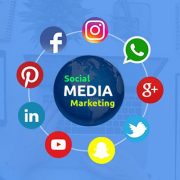Digital Marketing has increased and is now essential to any marketing plan. Digital Marketing is a collection of techniques that helps businesses reach their audience and achieve marketing goals. These include search engine optimization, social media marketing (SEO), email marketing, content marketing, etc.
Digital marketing projects are an excellent way for students to develop skills and gain experience they can use in the future. This article will cover the top 10 digital projects for students by 2023.
Social Media Marketing Campaign
Students can create a campaign for social media as a great project. Social media marketing involves developing and implementing strategies to promote a product or brand on platforms like Facebook, Instagram, Twitter, and LinkedIn. A social media marketing campaign can include posting on social media, running ads, and engaging followers to create a community.
Students can create a portfolio to showcase their social media campaign. This includes social media posts, copy, and graphics. Students can also present analytics and metrics about the campaign’s success, including engagement rates, reach, and conversions. Students can create case studies to detail how they started and executed the campaign and the results.
Students should showcase their skills and knowledge in Social Media Marketing by showcasing a range of projects.
Include social media content you created, such as videos, images, or posts.
Engagement rates (likes and shares), reach (number of people viewing the content), and conversions are all metrics that can be used to demonstrate your success.
Consider studying the campaign’s strategy, goals, and results. Include details like the target audience, content themes, posting frequency, and paid promotions.
If you are applying for a role in social media marketing, highlight your experience managing social media accounts and creating content. Also, engage with the audience. You can demonstrate your success with metrics like follower growth, engagement, and conversions.
Search Engine Optimization and Website Audit
SEO is essential for increasing a website’s visibility and driving organic visitors. An SEO Audit is a thorough analysis of a website’s on-page and off-page factors. Students can perform an SEO audit on a website as part of a digital project and identify improvement areas. It may involve optimizing a website’s content, increasing its speed, fixing broken hyperlinks, or ensuring that it is mobile-friendly.
Students can present their SEO audit by creating a document that analyzes a website’s performance in SEO and makes recommendations for improvements. The report may include metrics like keyword rankings, backlink analyses, and technical SEO concerns. The students can also give examples of their optimized content, metadata, and other on-page SEO techniques.
To impress employers, students should showcase various projects that show their skills and expertise in different areas, such as Search Engine Optimization and Website Audit.
Include specific websites or pages that you’ve optimized for search engines.
You can use metrics to show your success, such as search rankings, traffic on the page, or conversions, like form submissions and purchases.
Consider creating a study of the SEO strategy and objectives achieved. Include keyword research, on-page optimizations, link-building efforts, and technical changes.
Email Marketing Campaign
Email marketing can be a powerful tool to build relationships and nurture leads. Email Marketing campaigns involve sending subscribers targeted emails to drive conversions. Students can create an email campaign for a company or organization as part of a digital project. They will also design email templates and analyze campaign performance.
Students can use email templates, subject line examples, and calls to action to showcase their email marketing projects. Students can provide data on the success or failure of a campaign, such as the open rate, click-through rate, and conversion. Students can create case studies detailing how they developed and executed an email marketing campaign and achieved results.
Students must showcase various projects demonstrating the following skills and expertise in different channels and strategies to impress employers.
Include examples of your email content, such as promotional emails or newsletters.
Open rates, click-through rates, and conversions such as sign-ups, purchases, or subscriptions can be used to measure your success.
Consider creating a study that details an email marketing campaign’s strategy, goals, and results. Include details like the target audience, email themes, frequency, and A/B testing.
Pay-per-click (PPC), Advertising Campaigns (Google Ads (Google Ads), Facebook Ads (Linkedin Ads), and so on)
PPC advertising involves paying for every click on an ad placed on a search engine or social media platform. Students can use a PPC campaign as a digital project to create an advertising campaign for an organization or business. They will conduct keyword research, develop ad copy and analyze campaign performance.
Students can use a portfolio to showcase their PPC campaign. This includes examples of ad copy, graphics, and landing pages. Students can also present analytics about the campaign’s success, including click-through rate, conversion rate, and cost per click. Students can create case studies detailing how they created and executed the PPC campaign and the results that were achieved.
Students must showcase projects that show their skills and expertise in different channels and strategies to impress employers.
Include examples of the ad copy you’ve created and the landing pages for your PPC campaigns.
You can use metrics to show your success, such as click-through rate, conversions, and return on advertising spend (ROAS).
Consider creating a PPC case study to outline the strategy, goals, and results. Include details like the target audience, copy and design of ads, bidding strategy, and any optimizations based on performance.
Content Marketing Plan
Content marketing is creating and distributing valuable content to reach and retain your target audience. A content marketing strategy outlines how to create and distribute content in line with the business’s marketing goals. Students can develop a plan to create and distribute content for a company or organization. They can also create a calendar of topics, publication dates, and distribution channels.
A student can showcase their content marketing plan by creating a portfolio of examples, such as blog posts, infographics, and other materials they have created. Students can provide data on the success or failure of their content. This includes website traffic, social sharing, and engagement rates. Students can create case studies detailing how they created and implemented the content marketing plan and achieved results.




















Comments